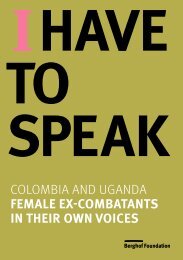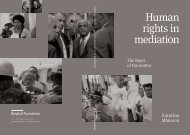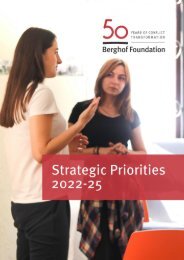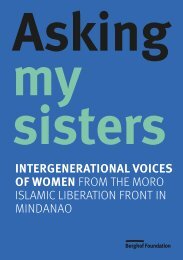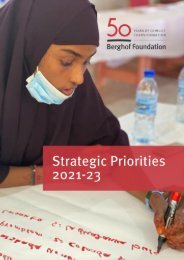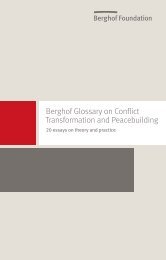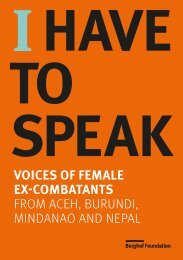Berghof Foundation: 50 years of conflict transformation
This book provides an overview of the Berghof Foundation’s work and impact over the past 50 years and sheds light on the challenges ahead of peacebuilding.
This book provides an overview of the Berghof Foundation’s work and impact over the past 50 years and sheds light on the challenges ahead of peacebuilding.
Create successful ePaper yourself
Turn your PDF publications into a flip-book with our unique Google optimized e-Paper software.
Supporting female<br />
ex-combatants from<br />
resistance and liberation<br />
movements<br />
2018–present<br />
One <strong>of</strong> the participants in the film project prepares to be interviewed. Photo: Juan Camilo Cruz Orrego / <strong>Bergh<strong>of</strong></strong> <strong>Foundation</strong><br />
Although women comprise up to 30 per cent <strong>of</strong><br />
the membership <strong>of</strong> various armed resistance and<br />
liberation movements (RLMs), their voices and<br />
aspirations are regularly sidelined during peace<br />
negotiations and post-war transitions. The role<br />
played by female combatants in <strong>conflict</strong> is <strong>of</strong>ten<br />
challenging to translate into participation in peace<br />
processes and post-war political settings, where men<br />
routinely assume leadership positions and expect<br />
women to find their place in the domestic sphere. The<br />
<strong>Bergh<strong>of</strong></strong> <strong>Foundation</strong> has been working with various<br />
RLMs on negotiation and process support since<br />
2005. Most representatives in this project, and hence<br />
most <strong>of</strong> the supported actors, were men, prompting<br />
one <strong>of</strong> <strong>Bergh<strong>of</strong></strong>’s long-term external consultants<br />
to pose the question: why not engage directly with<br />
women who have fought in RLMs?<br />
This led to an intense process <strong>of</strong> networkbuilding<br />
among female ex-combatants in various<br />
countries where RLMs were involved in negotiations<br />
and peace processes. In parallel, the search for<br />
funding for this work began and initially presented a<br />
challenge: female ex-combatants were a somewhat<br />
overlooked target group, their participation and<br />
leadership in post-war politics and reintegration into<br />
society being issues that did not feature prominently<br />
on the international agenda. Additionally, both<br />
domestically and internationally, there was some lack<br />
<strong>of</strong> recognition <strong>of</strong> female ex-combatants’ potential for<br />
driving positive change due to their past involvement<br />
in armed <strong>conflict</strong> and higher social marginalisation<br />
and stigmatisation compared to their male peers.<br />
After several attempts at searching for support, a<br />
small pilot project was eventually initiated in 2014<br />
with funding from the Robert Bosch <strong>Foundation</strong>;<br />
subsequent grants were provided by the German<br />
development agency GIZ and the Norwegian Agency<br />
for Development Cooperation (NORAD).<br />
In the last few <strong>years</strong>, the <strong>Bergh<strong>of</strong></strong><br />
<strong>Foundation</strong> has supported women from 11 RLMs<br />
across three continents in their efforts to ensure<br />
more gender-inclusive and gender-participatory<br />
peace negotiations and post-war democratic<br />
transitions. The experiences <strong>of</strong> women from<br />
five other groups that underwent war-to peace<br />
transitions 10-15 <strong>years</strong> ago have also been gathered<br />
and documented. For this, we worked with six<br />
local researchers, most <strong>of</strong> whom are themselves<br />
ex-combatants from demobilised armed groups in<br />
Aceh (Indonesia), Burundi, Mindanao (Philippines)<br />
and Nepal. The researchers collected and shared<br />
firsthand knowledge <strong>of</strong> the experiences <strong>of</strong> female<br />
combatants and their engagement in socio-political<br />
<strong>transformation</strong> processes. Overall, they recorded<br />
43 video interviews with their peers, identifying key<br />
lessons learned from their shared experiences. The<br />
resulting short film and booklet, ‘I Have To Speak’ —<br />
Voices <strong>of</strong> Female Ex-Combatants, seek to amplify<br />
some <strong>of</strong> the hidden and forgotten voices in <strong>conflict</strong><br />
and show that women and their experiences <strong>of</strong><br />
armed <strong>conflict</strong> need to be taken seriously in order<br />
to build sustainable peace. They also aim to show<br />
other female ex-combatants that they are not alone<br />
in their sense <strong>of</strong> being marginalised during such<br />
war-to-peace transitions, and that they have reason<br />
to feel empowered by their strength and resilience.<br />
The stories collected are those <strong>of</strong> friendship and<br />
camaraderie, <strong>of</strong> life and death, <strong>of</strong> perseverance<br />
and resistance, and <strong>of</strong> rebuilding lives after war and<br />
continuing the struggle in peaceful ways. Tripani<br />
Baijali, one <strong>of</strong> the researchers from Nepal, believes<br />
that “[the women’s] political awareness, skills and<br />
experiences should be transformed into useful<br />
human resources for the mainstream political scene<br />
by creating opportunities for them.” The interviews,<br />
film and stories are now used to train and build the<br />
capacities <strong>of</strong> women in RLMs who are currently in the<br />
process <strong>of</strong> emerging from armed struggle.<br />
An example <strong>of</strong> tangible outcomes <strong>of</strong><br />
<strong>Bergh<strong>of</strong></strong>’s support for female ex-combatants is<br />
our work with the Moro Islamic Liberation Front<br />
in Mindanao (Philippines), which successfully<br />
transitioned into a post-war political party following<br />
the peace agreement in 2014. Since then, the <strong>Bergh<strong>of</strong></strong><br />
<strong>Foundation</strong> has supported its women’s brigade,<br />
the Bangsamoro Islamic Women Auxiliary Brigade<br />
(BIWAB), in preparing itself for the prospect <strong>of</strong> postwar<br />
organisational transition. In late 2019, together<br />
with our local partner organisation, the Moro Women<br />
Development and Cultural Center (MWDECC),<br />
the <strong>Bergh<strong>of</strong></strong> team conducted tailor-made training<br />
for 32 central BIWAB members looking at options<br />
for establishing a self-led post-war ex-combatant<br />
women’s civilian association and developing a<br />
mission and aim for such an association. Following<br />
the training, BIWAB legally transformed itself into<br />
a regional association aiming to self-lead collective<br />
capacity-building for the political participation <strong>of</strong><br />
women ex-combatants and to support women in the<br />
implementation <strong>of</strong> the peace agreement and postwar<br />
politics in Mindanao.<br />
90<br />
91




